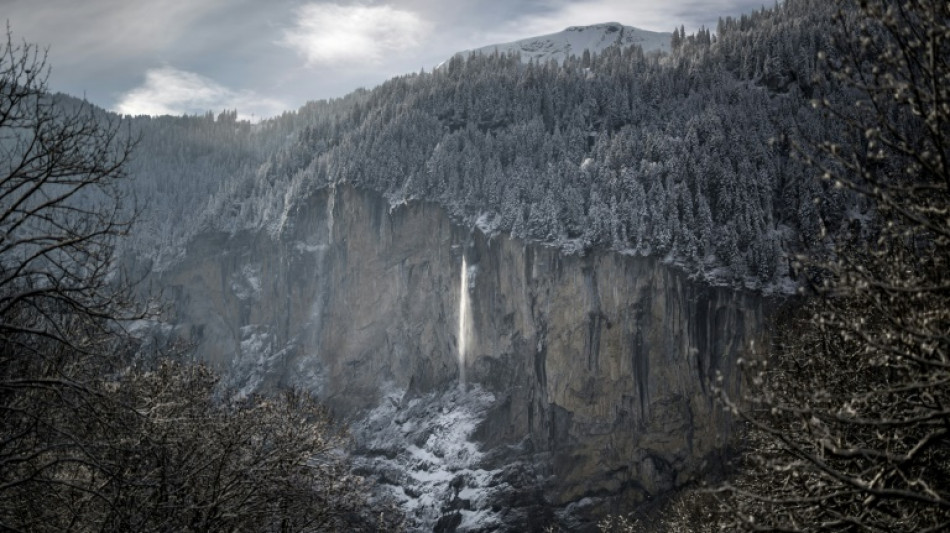

Swiss voters reject environment, pensions reforms: official results
Swiss voters rejected proposals to bolster biodiversity protections as well as a pensions reform in twin referendums on Sunday, according to projected results.
Switzerland may be associated with pristine natural landscapes, but environmentalists have sounded the alarm over its endangered ecosystems and were urging voters to back broader biodiversity protections.
The proposal failed, however, with only 37 percent of votes in favour and a turnout of 45.2 percent, according to provisional results reported by federal authorities around 1430 GMT on Sunday.
Voters also rejected a planned reform of the financing of the wealthy Alpine nation's pension system, the results indicated.
- Nature reform proposal -
The first proposal had the backing of a number of environmental protection organisations, including Pro Natura and BirdLife.
They warned that Switzerland's biodiversity "has declined".
"Switzerland has one of the highest levels of threatened species and environments among the European countries in the OECD (Organization for Economic Cooperation)", Sarah Pearson Perret, a Pro Natura director, told AFP, citing a report by the European Environmental Agency.
Published in 2020, that study shows that the percentage of protected zones compared to the national territory is lower in Switzerland than anywhere else in Europe.
The cantons of Basel-City and Geneva were the only ones to back the proposal.
The Swiss Union for Arts and Crafts said it was "relieved" that the initiative had been rejected and hailed voters' "foresight".
It claimed that if it had passed, the reform could have imperilled electricity and food production.
The country's top party, the right-wing UDC, said it hoped "moralising environmentalists will finally let Swiss farming families do their precious jobs in peace".
The Green Liberal Party of Switzerland however, viewed the outcome as a "missed opportunity to preserve our natural heritage, which is essential to the quality of life and the economy".
- Biodiversity investment -
Switzerland's federal government currently invests around 600 million Swiss francs ($700 million) each year in the preservation of biodiversity.
The organisations behind Sunday's referendum said that was not enough.
They were asking voters to approve boosting the biodiversity budget and to expand the number of protected areas.
A landmark biodiversity agreement reached in Montreal in 2022 called for at least 30 percent of the planet's lands and oceans to be protected by 2030.
But last year, Switzerland's Federal Office for the Environment (FOEN) said just 13.4 percent of the Alpine country's territory was dedicated to biodiversity conservation.
The FOEN acknowledges that Swiss biodiversity protection is insufficient, with half of all natural environments and a third of natural spaces threatened.
Aquatic environments and marshes are among the most threatened.
The organisations backing the referendum deemed the situation "alarming", stressing that "the mass extinction of species directly affects us humans".
Both the government and parliament came out against the proposal, insisting Switzerland is already doing enough and warning that the measures would severely impact the economy, agriculture, construction and energy production.
- Pensions reform proposal -
Swiss voters on Sunday also rejected a government-backed reform of pension financing, the projections indicated.
Federal authorities reported that 67.1 percent of voters had opposed it, with the no vote prevailing in every canton, and a turnout rate of 45 percent.
Swiss pensions are split into three pillars: the basic state pension, a compulsory pension fund into which employers and employees must pay and voluntary top-ups into private funds and investments.
According to the government, low financial market returns and rising life expectancy have left the second pillar underfinanced.
Bern's proposed reform would require employers and workers to raise their contributions into the obligatory occupational funds.
But the unions who demanded the reform be put to a referendum charged that it would force people to contribute more even as they would see their pension payments shrink.
The Swiss Trade Union Federation, an umbrella group of 20 unions, slammed the proposals as a "scam".
韓-L.Hán--THT-士蔑報




